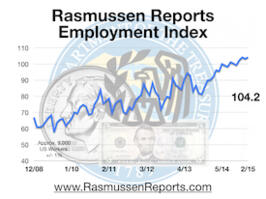43% Say 99 Weeks of Benefits Increase The Unemployment Problem
Congress is again debating whether to extend the funding that makes possible up to 99 weeks of state and federal unemployment benefits, even as Americans continue to express skepticism about benefits that last that long.
Thirty-nine percent (39%) of American Adults believe 99 weeks is too long a period to provide unemployment benefits, while 17% say it’s too short a time. A new Rasmussen Reports national telephone survey finds that just one-in-three Americans (33%) think the 99 week-period is about right. Twelve percent (12%) are not sure. (To see survey questions, click here.)
This marks virtually no change in voter sentiment since last year at this time when Congress last debated extending the benefits funding.
A plurality (43%) of adults still believes that providing unemployment benefits for 99 weeks actually increases the number of people who remain unemployed, although that’s down six points from 49% this time last year. Twenty-eight percent (28%) disagree and say benefits that run this long do not increase the level of unemployment, but another 29% are not sure.
Only 19% of those who say they or someone in their family has received unemployment benefits in the past year think 99 weeks of unemployment benefits are too long. But still a plurality (42%) of this group also feels that providing benefits for 99 weeks increases the number of those who remain unemployed.
Should Congress agree to continuing unemployment benefits for up to 99 weeks, as seems likely, 53% of all Americans think the better way to pay for it is raising taxes on the wealthy as opposed to cutting spending in other areas of the federal government. Forty-three percent (43%) feel that offsetting spending cuts are the better way to go.
Not surprisingly, 89% of Democrats prefer to raise taxes on the wealthy, while 78% of Republicans want to cut spending in other areas of the federal budget. Among those not affiliated with either of the major political parties, raising taxes on the wealthy is the preference but by a much narrower 51% to 43% margin.
(Want a free daily e-mail update? If it's in the news, it's in our polls). Rasmussen Reports updates are also available on Twitter or Facebook.
The survey of 1,000 Adults nationwide was conducted on December 3-4, 2011 by Rasmussen Reports. The margin of sampling error is +/- 3 percentage points with a 95% level of confidence. Field work for all Rasmussen Reports surveys is conducted by Pulse Opinion Research, LLC. See methodology.
Rasmussen Reports is a media company specializing in the collection, publication and distribution of public opinion information.
We conduct public opinion polls on a variety of topics to inform our audience on events in the news and other topics of interest. To ensure editorial control and independence, we pay for the polls ourselves and generate revenue through the sale of subscriptions, sponsorships, and advertising. Nightly polling on politics, business and lifestyle topics provides the content to update the Rasmussen Reports web site many times each day. If it's in the news, it's in our polls. Additionally, the data drives a daily update newsletter and various media outlets across the country.
Some information, including the Rasmussen Reports daily Presidential Tracking Poll and commentaries are available for free to the general public. Subscriptions are available for $4.95 a month or 34.95 a year that provide subscribers with exclusive access to more than 20 stories per week on upcoming elections, consumer confidence, and issues that affect us all. For those who are really into the numbers, Platinum Members can review demographic crosstabs and a full history of our data.
To learn more about our methodology, click here.





